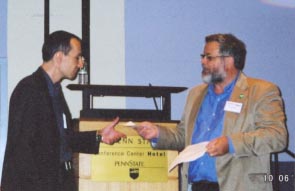Dan Zahavi, Self-Awareness and Alterity: A Phenomenological Investigation. Evanston, Illinois: Northwestern University Press, 1999.
“My reasons for nominating the book are many, but in essence I find that it exhibits three virtues. First, it is a clear and illuminating essay in the ‘new’ Husserl scholarship, i.e., it makes good use of unpublished sources to bring out new and important facets of Husserl’s position. Second, it engages constructively with other approaches to the issue—not only phenomenological approaches like that of Sartre or Michel Henry, but also non-phenomenological approaches such as that of the Hiedelberg School and in certain strains of analytic philosophy. Finally, and most importantly, it is an original piece of philosophy that keeps its eye clearly on the systematic issues at hand and has convincing things to say about them.
With a judicious use of argument and phenomenological analysis, Zahavi shows how a non-reflective self-awareness is both necessary (in order to account for the possibility of reflective self-awareness and the more developed modalities of self-consciousness) and possible (on the basis of the structure of phenomenological time). In the latter connection, he shows that Husserl cannot be considered an ‘internalist,’ i.e., an advocate of an ‘absolute’ consciousness enclosed in upon itself, but rather that his conception of intentionality makes sense only on the basis of a primitive ‘hetero-affection,’ the ‘alterity’ that is inseparable from selfhood.”




